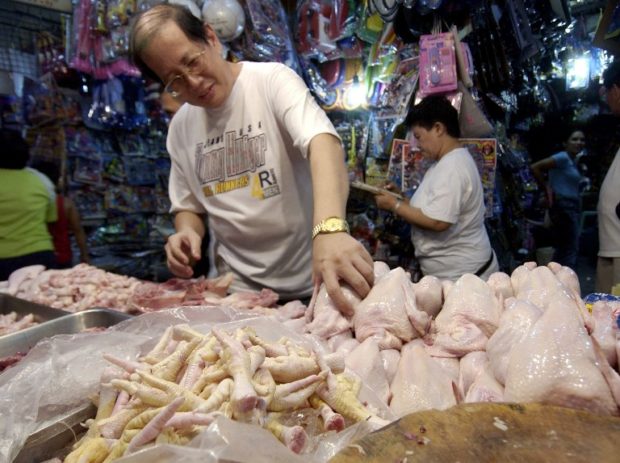
A customer buys chicken at a market in Manila. AFP FILE PHOTO/ROMEO GACAD
The avian flu outbreak in Pampanga has raised concern over the supply of quality chicken, but some of the country’s biggest poultry producers have given assurance that their farms are free from contamination.
San Miguel Purefoods and Robina Agri Partners said in separate statements that their chicken farms were avian flu-free while leading casual dining chain operator Max’s Group also said it was getting chicken from healthy sources.
“We should expect profit margins to shrink a bit given that chicken forms a significant part of the QSR (quick service restaurant) menu in the Philippines. The concern shouldn’t really be whether demand for chicken will fall, because that’s temporary given previous outbreaks of the disease. The profitability concern is more on the availability of supply should the duration of this condition persist longer than expected,” said Jose Mari Lacson, head of research at ATR Asset Management.
Lacson expressed concern that if the flu outbreak persists, inventory of top domestic producers may be constrained given that avian flu has affected stock elsewhere in Asia and there is no increase in the minimum access volume (MAV) for poultry in 2017.
MAV refers to the volume of a specific agricultural product that is allowed to be imported with a lower tariff as committed by the Philippines to the World Trade Organization (WTO) under the Uruguay Round Final Act.
“QSRs will have to find importers who would be willing to sell them their stock of frozen chicken or pay the higher price for current inventory. The hardest-hit segment, however, may be the wet markets since inventory sold in this format could be less than traditional retail. That may reflect in higher inflation in the coming months depending on how retailers react to ensure their respective inventories in the coming months,” Lacson said.
Biosecurity measures
For its part, San Miguel Purefoods assured consumers of Magnolia Chicken that its poultry farms remained free of avian flu and that it was implementing “rigorous biosecurity measures” in all farms to prevent contamination while adhering to international food safety and health standards.
“The company’s poultry houses utilize state-of-the-art climate controlled system and not conventional housing, that protects broilers from contact with wild birds,” Purefoods said. “The cool environment inside the houses provides broilers greater protection against respiratory infection and increased resistance to viruses.”
Purefoods also emphasized that it does not overstock broiler houses, thus providing 20 percent more floor space compared to standard practice. Upon immediate testing, the group reported that its farms and broiler flocks within the vicinity of the affected area yielded negative results for avian influenza.
Robina Agri Partners, which has been providing fresh eggs to consumers and high-quality pullets to partner farms for more than 20 years, also assured the public that its poultry facilities and products were avian influenza-free.
“Our poultry layer facilities are far from the affected area of San Luis, Pampanga. Nonetheless, we continue to implement strict biosecurity measures in our farms and submit our eggs to industry and government standards of testing and quality control,” Robina Agri said.
Fit for human consumption
It said its good animal husbandry practices certification ensured that its farm practices were meeting clients’ expectations in its commitment to deliver products fit for human consumption.
Both Purefoods and Robina Agri said they were working closely with the Bureau of Animal Industry and other agencies to help control the outbreak.
Paul Cheah, head of investor relations at Max’s Group Inc., said the bird flu outbreak had not affected its business.
“Sales have remained at normal levels,” he said, adding that consumption of chicken at its restaurants had not declined.
“It’s business as usual at the store level,” Cheah said.